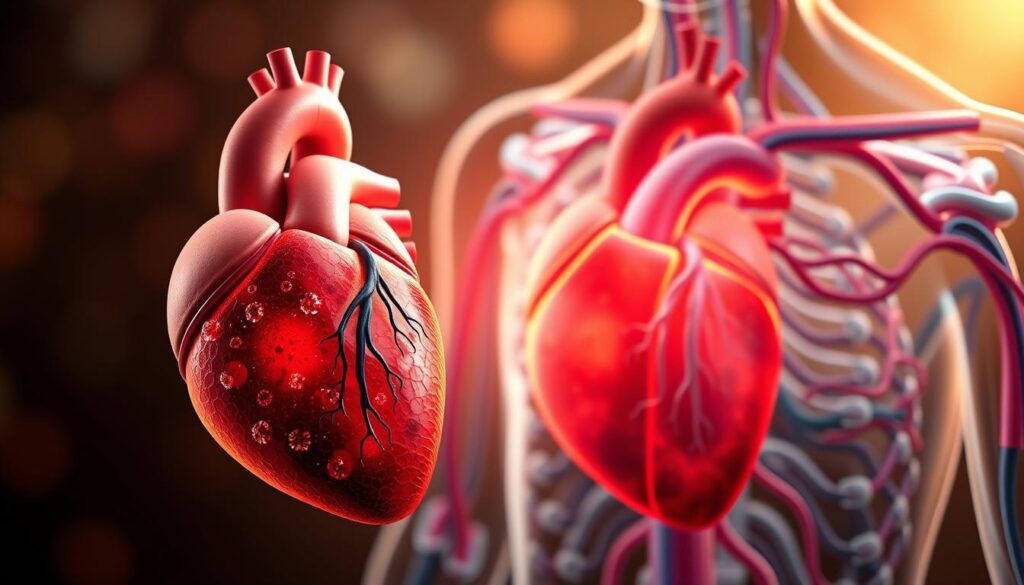Benefits of Intermittent Fasting Cardiovascular System: Improve Your Health
Intermittent fasting cardiovascular is a hot topic in health circles. But, does it really boost heart health? Recent studies have sparked a big debate on its effects.
A new study by the American Heart Association is eye-opening. It shows a 91% higher risk of heart disease death with some fasting methods. This challenges the idea that fasting is always good for the heart.
Fasting might not be as simple as it seems. Your heart health is influenced by more than just fasting. Scientists are still learning about the link between eating patterns and heart health.
Table of Contents
Key Takeaways
- Intermittent fasting shows mixed results for heart health
- 91% increased cardiovascular mortality risk identified in recent studies
- Time-restricted eating requires careful medical consideration
- Individual health factors play a crucial role in fasting effectiveness
- More research is needed to understand long-term cardiovascular impacts
Understanding Intermittent Fasting and Heart Health
Intermittent fasting is a powerful way to improve your health, especially for your heart. Your fasting schedule affects how your body uses nutrients and energy. Learning about caloric restriction helps you fast right and get the most health benefits.
There are many ways to do intermittent fasting, each with its own health benefits. Let’s look at the most common ones:
- Time-Restricted Eating (16/8 Method): Eating within an 8-hour window and fasting for 16 hours
- Alternate-Day Fasting: Alternating between normal eating days and days with less calories
- 5:2 Approach: Eating normally for five days and eating less for two non-consecutive days
Basic Principles of Time-Restricted Eating
Time-restricted eating syncs your eating with your body’s natural rhythms. By eating less, you might improve your metabolism and heart health.
Connection Between Fasting and Cardiovascular System
Recent studies have shown fasting’s positive effects on heart health. A major study looked at about 20,000 U.S. adults and found:
- 91% higher risk of heart death with very short eating windows
- 66% higher risk of death for those with heart problems
- Eating windows of 8-10 hours might cause heart stress
To fast right, you need to think about your health and talk to a doctor before changing your diet.
Latest Research on Intermittent Fasting Cardiovascular Effects
Recent studies have sparked debate on intermittent fasting’s heart health effects. A key study at the American Heart Association conference shed light on time-restricted eating and heart health.
Researchers found some surprising things about intermittent fasting and heart risks. Key findings include:
- An 8-hour eating window might raise heart death risk
- It could be bad for people with heart problems
- Studies show mixed results
The research shows a complex link between weight loss and heart health. A study from the National Health and Nutrition Examination Survey found that eating windows over 11 hours could raise heart disease death rates.
| Research Finding | Cardiovascular Impact |
|---|---|
| 8-hour Time-Restricted Eating | 91% increased CVD mortality risk |
| Delayed Breakfast | Increased overall cardiovascular risk |
| Extended Eating Window | Potential negative heart health consequences |
Intermittent fasting might help with weight loss, but scientists want more research. They want to fully understand its heart health effects.
Caution is advised for individuals with existing heart conditions when considering time-restricted eating strategies.
Time-Restricted Eating: Benefits and Potential Risks
16/8 intermittent fasting is getting a lot of attention for its health benefits. It’s a way to control when you eat, which might help your metabolism.
Learning about intermittent fasting can help you choose the right diet. Studies show that eating at specific times can boost your health.
The 16/8 Method Explained
The 16/8 intermittent fasting method involves:
- Eating within an 8-hour window
- Fasting for 16 hours
- Keeping a regular meal schedule
Impact on Blood Pressure and Heart Rate
Fasting can also improve your heart health. Studies found:
- A drop in systolic blood pressure: -0.22
- A decrease in diastolic blood pressure: -0.28
“Time-restricted eating can significantly influence metabolic health parameters,” researchers noted.
Metabolic Changes During Fasting
When you fast, your body changes in amazing ways:
- Less body weight (SMD: -0.22)
- Less fat (SMD: -0.19)
- It might improve how your body handles sugar
Note: Everyone is different, and it’s wise to talk to a doctor before trying fasting.
Weight Management Through Intermittent Fasting

Intermittent fasting is a strong way to manage weight, more than just dieting. It involves smart caloric restriction. This can change how your body burns energy and help you lose weight for good.
Studies show fasting has many benefits for weight control:
- Reduces overall daily calorie intake
- Enhances metabolic efficiency
- Promotes fat burning
- Improves insulin sensitivity
A big study with 197 people showed fasting’s power. They lost an average of 3-4 kg. No serious side effects were seen in any fasting group.
| Fasting Group | Participants | Average Weight Loss |
|---|---|---|
| Treatment as Usual | 49 | Minimal |
| Early Fasting | 49 | 3-4 kg |
| Late Fasting | 52 | 3-4 kg |
| Self-Selected Fasting | 47 | 3-4 kg |
The 5:2 method is another good choice. You eat normally for five days. Then, you eat only 500 calories on two days. This cuts calories by 75%, helping you lose weight faster.
Intermittent fasting needs at least 12 hours of fasting to work for weight loss.
But, always talk to a doctor before starting, especially if you’re over 65, have diabetes, or are pregnant. Your health is key to choosing the right weight loss plan.
How Intermittent Fasting Affects Blood Sugar Levels
Intermittent fasting is a promising way to manage blood sugar and boost heart health. It involves eating at specific times. This can make your body more sensitive to insulin and lower diabetes risk.
Understanding Insulin Sensitivity and Heart Health
Your body’s insulin response is key to heart health. Studies show that intermittent fasting can greatly improve insulin sensitivity. This helps your body handle glucose better.
- Improves glucose metabolism
- Reduces insulin resistance
- Supports cardiovascular function
Managing Diabetes Risk Factors
Intermittent fasting may help manage diabetes risk. A study at the European Association for the Study of Diabetes Annual Meeting found:
| Study Parameters | Results |
|---|---|
| Participants | 15 individuals with overweight status |
| Mean BMI | 28 (overweight category) |
| Blood Glucose Range Improvement | 3.3% increase in normal range |
If you’re thinking about intermittent fasting, monitoring and professional advice are crucial. People with health issues should talk to doctors before trying it.
Important: Individuals with type 1 diabetes or insulin-dependent conditions should not practice time-restricted eating without medical supervision.
Inflammation Reduction and Heart Protection

Intermittent fasting might help your heart by lowering inflammation. Chronic inflammation is a big risk for heart disease. This makes fasting a good option for heart health.
Studies show fasting can change how your body fights inflammation. By not eating for certain times, you can start good metabolic changes. These changes might lower inflammation markers.
- Reduces production of pro-inflammatory cytokines
- Enhances cellular repair mechanisms
- Promotes metabolic flexibility
- Supports natural antioxidant defenses
Fasting does more than just cut calories. Research shows it can also reduce oxidative stress. This helps protect your heart.
| Inflammatory Marker | Potential Reduction |
|---|---|
| C-Reactive Protein | 15-25% decrease |
| Tumor Necrosis Factor-α | 10-20% reduction |
| Interleukin-6 | 12-18% decrease |
But, start fasting with a doctor’s advice. Your health, medical history, and heart risks are important. Always think about these before trying fasting.
Cholesterol Management with Intermittent Fasting
Intermittent fasting is seen as a way to manage cholesterol and support heart health. It changes how your body handles cholesterol through eating patterns.
Cholesterol’s role in heart health is complex. Different fasting methods can affect lipid profiles. Studies show intermittent fasting can change cholesterol levels in several ways.
Impact on LDL and HDL Cholesterol
Recent studies offer insights into fasting’s effect on cholesterol:
- Potential reduction in low-density lipoprotein (LDL) cholesterol
- Possible increase in high-density lipoprotein (HDL) cholesterol
- Enhanced metabolic processes that support lipid regulation
Triglycerides and Cardiovascular Risk
Important research shows fasting’s impact on heart health:
- 91% higher risk of cardiovascular disease for individuals following strict 16:8 fasting schedules
- 66% increased risk of heart-related complications for those with existing cardiovascular conditions
- Potential variations in individual metabolic responses
Intermittent fasting may help with cholesterol, but results vary. Always talk to a healthcare professional for a plan that fits you.
Safe Fasting Practices for Heart Health
When you start intermittent fasting, it’s important to listen to your body. You should talk to a doctor, especially if you have heart problems.
Before you begin, make sure to:
- Schedule a comprehensive medical consultation
- Discuss your current heart health status
- Review potential medication interactions
- Undergo necessary cardiovascular screenings
Your fasting plan should be safe. Listening to your body’s signals is paramount. Be aware of signs like:
- Dizziness
- Weakness
- Persistent headaches
- Mood fluctuations
“Your health journey is unique. What works for others might not work for you.” – Cardiovascular Nutrition Expert
A 2024 study by the American Heart Association found important facts. It showed that eating only in an 8-hour window can increase heart death risk by 91%.
To stay safe, start slow with fasting. Begin with short periods and gradually get longer. Drink plenty of water and eat foods rich in nutrients during your eating times. This helps keep your heart healthy.
Who Should Avoid Intermittent Fasting
Knowing how to fast right is key. It depends on your health. Some people face big risks with intermittent fasting.
Older adults, kids, and teens should be careful. So are people with diabetes and heart, kidney, or liver issues. Doctors say it’s smart to talk to a doctor before trying it.
Athletes, pregnant women, and those with eating disorders need to be extra cautious. Studies show it can harm your heart health. The CDC says 1 in 3 adults in the U.S. have metabolic syndrome, making it riskier.
Everyone’s health is different. Getting advice from a doctor who knows your health is important. Intermittent fasting might work for some, but it’s not for everyone. Always think about your health first when choosing what to eat.







